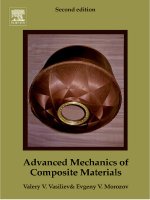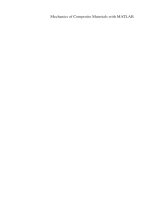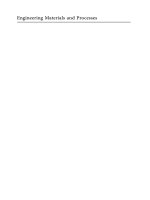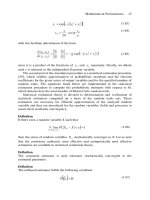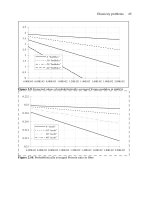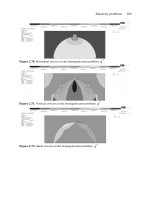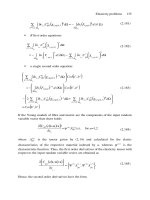Computational Mechanics of Composite Materials part 15 pptx
Bạn đang xem bản rút gọn của tài liệu. Xem và tải ngay bản đầy đủ của tài liệu tại đây (104.34 KB, 13 trang )
References 405
226. Lesne PM, Allio N, Valle R, (1995) Combined effects of the fibre
distribution and of the fibre matrix or interphase matrix transverse modulus
ratio on the possible fracture modes of unidirectional composites submitted
to a transverse loading. Acta Metall. Mater. 43(12):4247-4266, 1995.
227. ymptotic
Analysis and Homogenization. Ser. Adv. Math. Appl. Sci. 52, World Sci.
Publ, Singapore.
228. Li JY, (1999) On micromechanics approximation for the effective
thermoelastic moduli of multi-phase composite materials. Mech. Mat.
31:149-159.
229. Liaw PK et al., (1995) Materials characterization of silicon carbide
reinforced titanium (Ti/SCS-6) metal matrix composites: part I. Tensile and
fatigue behavior. Metall. Mat. Trans. A 26A:3225-3247.
230. Lim LG, Dunne FPE, (1996) The effect of volume fraction on reinforcement
on the elastic-viscoplastic response of metal-matrix composites. Int. J. Sol.
Struct. 38(1):19-39.
231. Lin SC, (2000) Reliability predictions of laminated composite plates with
random system parameters. Prob. Engrg. Mech. 15:327-338.
232. Lin S, Garmestani H, (2000) Statistical continuum mechanics analysis of an
elastic two-isotropic-phase composite material. Comp. Part B: Engrg. 31:39-
46.
233. Lin YK, (1967) Probabilistic Theory of Structural Dynamics. McGraw-Hill,
New York
234. Lin YK, Yang JN, (1982) A stochastic theory of fatigue crack propagation.
AIAA J. 23(1):117-124.
235. Liu B, (2003) Adaptive harmonic wavelet transform with applications in
vibration analysis. J. Sound Vibr. 262:45-64.
236. Liu WK et al., (2000) Multi-scale methods. Int. J. Num. Meth. Engrg.
47:1343-1361.
237. Liu WK, Belytschko T, Mani A, (1986) Probabilistic finite elements for
nonlinear structural dynamics. Comput. Meth. Appl. Mech. Engrg. 56:61-81.
238. Liu ML, Yu J, (2003) Finite element modeling of delamination by layerwise
shell element allowing for interlaminar displacements. Comp. Sci. Techn.
63:512-529.
239. Luciano R, Willis JR, (2001) Non-local constitutive response of a random
laminate subjected to configuration-dependent body force. J. Mech. Phys.
Solids 49:431-444.
240. Lund E, (1998) Shape optimization using Weibull statistics of brittle failure.
Struct. Optimiz. 15:208-214.
241. Lutes LD (1987) An Introduction to Stochastic Structural Fatigue. Rice
University Press
242. Lüth H (2001) Solid Surfaces, Interfaces and Thin Films. 4
th
Edition.
Springer-Verlag Berlin Heidelberg
243. Ma F, Wong FS, Caughey TK, (1983) On the Monte-Carlo methodology for
cumulative damage. Comput. & Struct. 17(2):177-181.
406 Computational Mechanics of Composite Materials
244. Madsen HO, (1984) Bayesian fatigue life prediction. Probabilistic Methods
in the Mechanics of Solids and Structures. Eddwertz S, Lind NC, (edrs.)
Proc. IUTAM Symp., Stockholm, pp 395-406.
245. Madsen B, Lilholt H, (2003) Physical and mechanical properties of
unidirectional plant fibre composites – an evaluation of the influence of
porosity. Comp. Sci. Techn. 63:1265-1272.
246. Mao H, Mahadevan S, (2002) Fatigue damage modeling of composite
materials. Comp. Struct. 58:405-410.
247. McEvily AJ, Groeger J, (1977) On the Threshold for Fatigue Crack Growth.
Proc. 4
th
Int. Conference on Fracture vol. II, Canada, pp 1293-1298.
248. Meguid SA, Kalamkarov AL, (1994) Asymptotic homogenization of elastic
composite materials with a regular structure. Int. J. Sol. Struct. 31(3): 303-
316.
249. Meirovitch L (1975) Elements of Vibration Analysis. McGraw & Hill
250. Michel JC et al., (1999) Effective properties of composite materials with
periodic microstructures: a computational approach, Comput. Meth. Appl.
Mech. Engrg. 172(1-4):109-144.
251. Mignolet MP, Mallick K, (1995) Random inelastic behavior of composite
materials with local load sharing. Prob. Engrg. Mech. 10:83-93.
252. Miloh T, Benveniste Y, (1999) On the effective conductivity of composites
with ellipsoidal inhomogeneities and highly conducting interfaces. Proc.
Roy. Soc. Lond. A 455:2687-2706.
253. Milton GW (2002) The Theory of Composites. Cambridge University Press
254. Mischke CR (1986) Probabilistic views of the Palmgren-Miner damage rule.
ASME 86-WA/E-23
255. Mital SK, Murthy PLN, Chamis CC, (1993) Interfacial microfracture in high
temperature metal matrix composites. J. Comp. Mat. 27(17):1678-1694.
256. Moro T, El Hami A, El Moudni A, (2002) Reliability analysis of a
mechanical contact between deformable solids. Prob. Engrg. Mech. 17:227 -
232.
257. Morrow JD (1986) The effect of selected subcycle sequences in fatigue
loading histories. Random fatigue life prediction. ASME PVP 72, pp 43-60.
258. Moser B, (2003) The influence of non-linear elasticity on the determination
of Weibull parameters using the fibre bundle test. Composites: Part A
34:907-912.
259. Mura T (1982) Micromechanics of Defects in Solids. Sijthoff and Noordhoff
260. Müller WH, Schmauder S, (1993) Interface stresses in fiber-reinforced
materials with regular fiber arrangements. Comp. Struct. 24:1-21.
261. Nag A, (2003) A spectral finite element with embedded delamination for
modeling of wave scattering in composite beams. Comp. Sci. Techn.
63:2187-2200.
262. Nakayasu H, Maekawa Z, Rackwitz R, (1989) Reliability - oriented
materials design of composite materials. Proc. 5th Conf. Struct. Safety &
Reliability, pp 2095-2098.
263. Nayfeh AH (1973) Perturbation Methods. Wiley
References 407
264. Nelli-Silva EC, Ono Fonseca JS, Kikuchi N, (1997) Optimal design of
piezoelectric microstructures. Comput. Mech. 19:397-410.
265. Nemat-Nasser S, Hori M (1993) Micromechanics: Overall Properties of
Heterogeneous Material. North-Holland, Amsterdam
266. Nomura S, (1987) Effective medium approach to matrix-inclusion type
composite materials. ASME Trans. 54:880-883.
267. Nomura S, Ball DL, (1994) Stiffness reduction due to multiple microcracks
in transverse isotropic media. Engrg. Fract. Mech. 48(5):649-653.
268. Noor AK (edr.), (1990) Symbolic Computations and Their Impact on
Mechanics. ASME PVP-205.
269. Noor AK, Shah RS, (1993) Effective thermoelastic and thermal properties of
unidirectional fiber-reinforced composites and their sensitivity coefficients,
Int. J. Comp. Struct. 26:7-23.
270. Ochiai S et al., (2003) Modeling of residual stress-induced stress-strain
behavior of unidirectional brittle fiber/brittle matrix composite with weak
interface. Comp. Sci. Techn. 63:1027-1040.
271. Oden JT (1972) Finite Elements of Nonlinear Continua. McGraw-Hill
272. Oden JT et al., (2003) Research directions in computational mechanics.
Comput. Meth. Appl. Mech. Engrg. 192:913-922.
273. Onkar AK, Yadav D, (2003) Non-linear response statistics of composite
laminates with random material properties under random loading. Comp.
Struct. 60:375-383.
274. Ostoja-Starzewski M, (1999) Microstructural disorder, mesoscale finite
elements and macroscopic response. Proc. Roy. Soc. Lond. A 455:3189-
3199.
275. Ostoja-Starzewski M, Jasiuk I, (1994) Micromechanics of random media.
Proc. 1
st
Joint ASCE-ASME-SES Symp. “Micromechanics of Random
Media” Appl. Mech. Rev. 47(1/2)
276. Owen DRJ, Hinton E (1980) Finite Elements in Plasticity Theory and
Practice. Pineridge Press
277. Paepegem Van W, Degrieck J, De Baets P, (2001) Finite element approach
for modeling fatigue damage in fibre-reinforced composite materials. Comp.
Part B: Engrg. 32:575-588.
278. Pankov AA, (1999) Solution of the stochastic boundary-value problem of
elasticity theory for composites with disordered structures in the correlative
approximation of the method of quasi-periodic components. Mech. Comp.
Mat. 35(4):315-324.
279. Paris F, Correa E, Cañas J, (2003) Micromechanical view of failure of the
matrix in fibrous composite materials. Comp. Sci. Techn. 63:1041-1052.
280. Paris PC, Erdogan F (1962). A critical analysis of crack propagation laws.
ASME 62-WA-234.
281. Pedersen P (edr.), (1993) Optimal Design with Advanced Materials. Elsevier
282. Peng XQ et al., (1998) A stochastic finite element method for fatigue
reliability analysis of gear teeth subjected to bending. Comput. Mech.
21:253-261.
408 Computational Mechanics of Composite Materials
283. Pepper DW, Heinrich JC (1992) The Finite Element Method. Series in
Computational and Physical Processes in Mechanics and Thermal Sciences.
Hemisphere
284. Peric D, Owen DRJ, (1992) Computational model for 3-D contact problems
with friction based on the penalty method. Int. J. Num. Meth. Engrg.
35:1289-1309.
285. Pham DC, (1999) Bounds for the elastic shear moduli of isotropic and quasi-
symmetric composites and exact modulus of the coated sphere assemblage.
Math. Mech. Sol. 4:57-69.
286. Philips LN (ed.), (1989) Design with Advanced Composite Materials.
Springer-Verlag
287. Philippidis TP, Lekou DJ, Kalogiannakis GA, (2000) On the stochastic
nature of thermomechanical properties in glass reinforced polyester
laminates. Comp. Struct. 49:293-301.
288. Phoenix SL, (2000) Modeling the statistical lifetime of glass fiber/polymer
matrix composites in tension. Comp. Struct. 48:19-29.
289. Phoon KK et al., (2002) Implementation of Karhunen-Loeve expansion for
simulating using a wavelet-Galerkin scheme. Prob. Engrg. Mech. 17:293-
303.
290. Pridle EK, (1976) High-cycle fatigue crack propagation under random and
constant amplitude loading. Int. J. Press Vessels & Piping 4:89-117.
291. Pochiraju KV, Lau ACW, Wang ASD, (1994) A local-global matching
method for the single fiber pullout problem with perfectly bonded interface.
Comput. Mech. 14(1):84-99.
292. Qian W, Sun CT, (1998) A frictional interfacial crack under combined shear
and compression. Comp. Sci. Techn. 58:1753-1761.
293. Quek ST et al., (2001) Sensitivity analysis of crack detection in beams by
wavelet technique. Int. J. Mech. Sci. 43:2899-2910.
294. Rao HS et al., (1997) A model of heat transfer in brake pads by
mathematical homogenization. Sci. Engrg. Comp. Mat. 6(4):219-224.
295. Rahul-Kumar P et al., (2000) Interfacial failures in a compressive shear
strength test of glass/polymer laminates. Int. J. Sol. Struct. 37:7281-7305.
296. Ratwani MM, Kan HP, (1981) Compression fatigue analysis of fiber
composites. AIAA J Aircraft 18(6).
297. Reddy JN (1984) Energy and Variational Methods in Applied Mechanics.
Wiley
298. Reifsnider KL (edr.), (1991) Fatigue of Composite Materials. Elsevier
299. Reifsnider KL, Stinchcomb WW, (1986) A critical-element model of the
residual strength and life of fatigue - loaded composite coupons. In: Hahn
HT. (edr.), Composite Materials: Fatigue and Fracture, ASTM STP 907,
Philadelphia, pp 298-313.
300. Renaudin P et al., (1997) Heterogeneous solids - Part II: numerical 2-D
results on boundary and other relevant phenomena. Eur. J. Mech. A/Solids
16(3):425-443.
References 409
301. Rice JR et al., (1990) Mechanics and thermodynamics of brittle interfacial
failure in bimaterial systems. In: Ruhle M et al. (edrs.), Metal-Ceramic
Interfaces. Pergamon Press, Oxford, pp 269-294.
302. Roberts R, Kibler JJ, (1971) Some aspects of fatigue crack propagation.
Engrg. Fract. Mech. 2:243-260.
303. Rocha PA, Cruz ME, (2001) Computation of the effective conductivity of
unidirectional fibrous composites with an interfacial thermal resistance.
Numer. Heat Transfer Part A 39:179-203.
304. Roh YS, Xi Y, (2000) A general formulation for transition probabilities of
Markov model and the application to fracture of composite materials. Prob.
Engrg. Mech. 15:241-250.
305. Rosen BW, Hashin Z, (1970) Effective thermal expansion coefficients and
specific heats of composite materials. Int. J. Engrg. Sci. 8:157-173.
306. Sab K, (1992) On the homogenization and the simulation of random
materials. Eur. J. Mech. A/Solids. 11:585-607.
307. Saleeb AF et al., (2003) An anisotropic viscoelastoplastic model for
composites – sensitivity analysis and parameter estimation. Comp. Part B:
Engrg. 34:21-39.
308. Sanchez-Palencia E (1980) Non-homogeneous Media and Vibration Theory.
Lecture Not. Phys. No. 127, Springer-Verlag
309. Sanchez-Palencia E, Zaoui A, (1987) Homogenization Techniques for
Composite Media. Lect. Notes Phys. No. 272, Springer-Verlag
310. Savic V, Tuttle ME, Zabinsky ZB, (2001) Optimization of composite I-
sections using fiber angles as design variables. Comp. Struct. 53:265-277.
311. Schapery RA, (1968) Thermal expansion coefficients of composite materials
based on energy principles. J. Comp. Mat. 2(3):380-404.
312. Schellekens JCJ (1990) Computational Strategies for Composite Structures,
TU Delft
313. Schuëller GI, (1997) A state-of-the-art report on computational stochastic
mechanics. Prob. Engrg. Mech. 12(4):197-321.
314. Selvadurai APS, Boulon MJ, (1995) Mechanics of Geomaterial Interfaces.
Stud. Appl. Mech. 42. Elsevier
315. Sevostianov I, Kachanov M, (2002) Explicit cross-property correlations for
anisotropic two-phase composite materials. J. Mech. Phys. Solids. 50: 253-
282.
316. Sevostianov I, Verijenko V, Kachanov M, (2002) Cross-property
correlations for short-fiber reinforced composites with damage and their
experimental verification. Comp. Part B: Engrg. 33:205-213.
317. Shiao MC, Chamis CC, (1999) Probabilistic evaluation of fuselage-type
composite structures. Prob. Engrg. Mech. 14:179-187.
318. Shih CF, (1991) Cracks on bimaterial interfaces: elasticity and plasticity
aspects. Mat. Sci. Engrg. A143:77-90.
319. Shinozuka M, Deodatis G, (1988) Stochastic process models for earthquake
ground motion. Prob. Engrg. Mech. 3(3):114-123.
410 Computational Mechanics of Composite Materials
320. Sigmund O, Materials with prescribed constitutive parameters: an inverse
homogenization problem. Int. J. Sol. Struct. 31(17): 2313-2329, 1994.
321. Simkins DC, Li S, (2003) Effective bending stiffness for plates with
microcracks. Arch. Appl. Mech. 73:282-309.
322. Simo JC et al., (1985) A perturbed Lagrangian formulation for the finite
element solution of contact problems. Comput. Meth. Appl. Mech. Engrg.
51:163-180.
323. Gabor,
Morlet and general harmonic wavelet functions. J. Sound. Vibr. 264:545-
557.
324. Singh BN, Yadav D, Iyengar NGR, (2001) Natural frequencies of composite
plates with random material properties using higher-order shear deformation
theory. Int. J. Mech. Sci. 43:2193-2214.
325. Van der Sluys O, Schreurs PJG, Meijer HEH, (1999) Effective properties of
a viscoplastic constitutive model obtained by homogenization. Mech. Mat.
31:743-759.
326. Sobczyk K, (1991) Stochastic Differential Equations with Applications to
Physics and Engineering. Kluwer Academic Publishers
327. Sobczyk K, Spencer BF (1992) Random Fatigue: from Data to Theory.
Academic Press
328. Steinberg BZ, McCoy JJ, Mirotznik M, (2000) A multiresolution approach
to homogenization and effective modal analysis of complex boundary value
problems. SIAM J. Appl. Math. 60(3):939-966.
329. Steinberg BZ, McCoy JJ, (1999) A multiresolution homogenization of
modal analysis with application to layered media. Math. Comput. Simul.
50:393-417.
330. Strzelecki T, (1996) Mechanics of Heterogeneous Media. Homogenization
331. Sung DU, Kim CG, Hong CS, (2002) Monitoring of impact damages in
composite laminates using wavelet transform. Comp. Part B: Engrg. 33:35-
43.
332. Suquet P, Continuum Micromechanics. CISM Courses and Lectures No 377.
Springer Wien New York.
333. Sutherland LS, Guedes Soares C, (1997) Review of probabilistic models of
the strength of composite materials. Reliability Engrg & System Safety
56:183-196.
334. Sweldens W (1994) The Construction and Application of Wavelets in
Numerical Analysis. Ph.D. Thesis, Columbia
335. Tabiei A, Sun J, (1999) Statistical aspects of strength size effect of laminated
composite materials. Comp. Struct. 46:209-216.
336. Talreja R, (1986) Composite laminates with cracks. Engrg. Fract. Mech.
25(5/6):751-762.
337. Talreja S (edr.), (1994) Damage Mechanics of Composite Materials, Elsevier
338. Tanov R, Tabiei A, (2000) A note on finite element implementation of
sandwich shell homogenization. Int. J. Num. Meth. Engrg. 48:467-473.
References 411
339. Tartar L, (1992) On mathematical tools for studying partial differential
equations of continuum physics: H-measures and Young measures. In:
Butazzo G et al., New Developments in Partial Differential Equations and
Applications to Mathematical Physics, Plenum Press, pp. 201-217.
340. Terada K, Kikuchi N, (2001) A class of general algorithms for multi-scale
analyses of heterogeneous media, Comput. Meth. Appl. Mech. Engrg.
190:5427-5464.
341. Terada K, Miura T, Kikuchi N, (1997) Digital image-based modeling
applied to the homogenization analysis of composite materials. Comput.
Mech. 20:331-346.
342. Thierauf G, (1995) Optimal topologies of structures. Homogenization,
pseudo-elastic approximation and the bubble-method. Engrg. Comput.
13(1):86-102.
343. Tian J, Li Z, Su X, (2003) Crack detection in beams by wavelet analysis of
transient flexural waves. J. Sound Vibr. 261:715-727.
344. Timoshenko S, Goodier SN (1951) Theory of Elasticity. McGraw-Hill, Inc.
345. Todinov MT, (2002) Distribution of properties from sampling
inhomogeneous materials by line transects. Prob. Engrg. Mech. 17:131-141.
346. Todinov MT, (2003) Statistics of inhomogeneous media formed by
nucleation and growth. Prob. Engrg. Mech. 18:139-149.
347. Torquato S, (2000) Modeling of physical properties of composite materials.
Int. J. Sol. Struct. 37:411-422.
348. Trykozko A, Zijl W, (2002) Complementary finite element methods applied
to the numerical homogenization of 3D absolute permeability. Comm. Num.
Meth. Engrg. 18:31-41.
349. Tryon RG, Cruse TA, (1997) Probabilistic mesomechanical fatigue crack
nucleation model. ASME J. Engrg. Mat. Techn. 119:65-70.
350. Tsai GG, Doyle JF, Sun CT, (1987) Frequency effects on the fatigue life and
damage of graphite/epoxy composites. J. Comp. Mat. 21:2-13.
351. Tsai SW, Hahn HT (1980) Introduction to Composite Materials.
352. Tsai SW, Wu EM, (1971). A general theory of strength for anisotropic
materials. J. Comp. Mat. 5:58-80.
353. Tsukrov I, Kachanov M, (2000) Effective moduli of an anisotropic material
with elliptical holes of arbitrary orientational distribution. Int. J. Sol. Struct.
37:5919-5941.
354. Tsurui A et al., (1989) Time variant structural reliability analysis using
diffusive crack growth models. Engrg. Fract. Mech. 34(1):153-167.
355. Tveergard V (1990) Failure by ductile cavity growth at a metal/ceramic
interface. DCAMM Rep. No. 406
356. Van den Nieuwenhof B, Coyette JP, (2003) Modal approaches for the
stochastic finite element analysis of structures with material and geometrical
uncertainties. Comput. Meth. Appl. Mech. Engrg. 192:3705-3729.
357. Vanmarcke E (1983) Random fields. Analysis and Synthesis. MIT Press
412 Computational Mechanics of Composite Materials
358. Wang W, Jasiuk I, (1998) Effective elastic constants of particulate
composites with inhomogeneous interphases. J. Comp. Mat. 32(15):1391-
1424.
359. Wang X, Sun JQ, (2003) Random fatigue of a higher order sandwich beam
with parameter uncertainties. J. Sound Vibr. 260:349-356.
360. Waite SR, (1990) Use of embedded optical fiber for significant fatigue
damage detection in composite materials. Composites 21(3):225-231.
361. Wang P, (1992) Homogenization for inhomogeneous elastic body containing
gas bubbles. Appl. Anal. 44:1-20.
362. Weihe S, Kröplin B, (1993) Micromechanical simulation of the initiation of
a delamination. Proceedings of MECAMAT’93 Seminar: Micromechanics
of Materials, France, pp 485-498.
363. Wheeler L, Luc C, (1999) On conditions at an interface between two
materials in three-dimensional space. Math. Mech. Sol. 4:183-200.
364. Whitworth HA, (1987) Modeling stiffness reduction of graphite/epoxy
composite laminates. J. Comp. Mat. 21:362-372.
365. Wiener N, (1958) Nonlinear Problems in Random Theory. MIT Press
366.
compliances of fibrous polymeric composites. J. Comp. Mat. 34(1):2-26.
367. Williams JG, (1987) Fracture Mechanics of Polymers. Ellis Horwood, Inc.
368. ion in Some
369. Wolf JP, Song C, (2001) The scaled boundary finite-element method – a
fundamental solution-less boundary-element method. Comput. Meth. Appl.
Mech. Engrg. 190:5551-5568.
370.
Warszawa
371. Wriggers P, Zavarise G, (1996) On the application of augmented Lagrangian
techniques for nonlinear constitutive laws in contact interfaces. Comm.
Appl. Num. Meth., 9:815-824.
372. Wu WF, Cheng HC, Kang CK, (2000) Random field formulation of
composite laminates. Comp. Struct. 49:87-93.
373. Wu WF, Ni CC, (2003) A study of stochastic fatigue crack growth modeling
through experimental data. Prob. Engrg. Mech. 18:107-118.
374. Xiao F, Hui CY, (1994) A boundary element method for calculating the K
field for cracks along a bimaterial interface. Comput. Mech. 15:58-78.
375. Yadav D, Verma N, (1998) Free vibration of composite circular cylindrical
shells with random material parameters. Part I: general theory. Comp. Struct.
41:331-338.
376. Yang C, (2000) Design and analysis of composite pipe joints under tensile
loading, J. Comp. Mat. 34(4):332-349.
377. Yao JTP. et al., (1986) Stochastic fatigue, fracture and damage analysis.
Struct Safety 3:231-267.
378. Yeh HL, Yeh HY, (2000) Elastic moduli of laminated composites revisited
by using statistical analysis. Comp. Part B: Engrg. 31:57-64.
References 413
379. Yokobori T, (1979) A critical evaluation of mathematical equations for
fatigue crack growth with special reference to ferrite grain size and
monotonic yield strength dependence. In: Fong JT, (edr.) Fatigue
Mechanisms, Proc. ASTM-NBS-NSF Symp, ASTM STP 675, pp 683 -706.
380. Young RK (1993) Wavelet Theory and its Applications. Kluwer
381. Zaidman M, Ponte-Castaneda P, (1995) Effective yield surfaces for
anisotropic composite materials. In: Parker DF, England AH, (edrs.) IUTAM
Symposium on Anisotropy, Inhomogeneity and Nonlinearity in Solid
Mechanics. Kluwer, pp 415-422.
382. Zavarise G. et al., (1998) A method for solving contact problems. Int. J.
Num. Meth. Engrg., 42(3):473-498.
383. Zeman J, Sejnoha M, (2001) Numerical evaluation of effective elastic
properties of graphite fiber tow impregnated by polymer matrix. J. Mech.
Phys. Solids 49:69-90.
384. Zhao YH, Weng GJ, (1996) Plasticity of a two-phase composite with
partially debonded inclusions. Int. J. Plasticity 12(6):781-804.
385. Zheng XJ, Wang X, Zhou YH, (2000) Magnetoelastic analysis of non-
circular superconducting partial torus. Int. J. Sol. Struct. 37:563-576.
386.
application to laminated beams. Comput. & Struct. 81:1087-1098.
387. Zienkiewicz OC, Taylor RL (2000) The Finite Element Method. 5
th
Edition.
Butterworth-Heinemann
388. Zohdi TI, Wriggers P, (2001) A model for simulating the deterioration of
structural-scale material responses of microheterogeneous solids. Comput.
Meth. Appl. Mech. Engrg. 190(22-23):2803-2823.
389. Zweben C, Hahn HT, Chou TW (edrs.), (1989) Delaware Composites
Design Encyclopedia, Lancaster, Technomic Publishing Co.
Index
acceleration 25
average stress criterion 254
augmented Lagrangian method
244,268
Box-Muller method 14
Bussinesq problem 301
Central Limit Theorem 12
coefficient of asymmetry 18
coefficient of concentration 18
coefficient of correlation 18
coefficient of variation 18,315
combinations 2
compliance tensor 164
composite pipe joint 255
concentration matrix 171
consistent estimator 15
contact stress 302
contact surface 301
contact surface finite element 242
covariance matrix 315
crack orientation angle 235
critical stress intensity factor 254
cumulative distribution function 5
damage function 224,228
damping matrix 23,347
delamination 238
design variables vector 189
displacement 25
displacement, expected values 26
displacement, cross-covariances 26
Dundur mismatch parameter 241
effective elasticity tensor
86,87,90,97,131-
133,149,156,171
effective elasticity tensor, covariances
34,115,116,140,143
effective elasticity tensor, expected
values
34,87,90,115,116,139,149,156
effective elasticity tensor, coefficient
of variation 87,90,145,156
effective elasticity tensor, Mori-
Tanaka method 88
effective elasticity tensor, self-
consistent approach 88
effective elasticity tensor, sensitivity
gradients 201,206,212,361
effective elasticity tensor, effective
modules method 94
effective elasticity tensor, upper and
lower bounds 132,133,146,155
effective heat conductivity 354
effective heat conductivity, Cylinder
Assemblage Model 191
effective heat conductivity, Spherical
Inclusion Model 191
effective mass density 74
effective stress tensor 267
effective yield stress, expected values
181
effective yield stress, variances 181
effective yield surface 172
effective Young modulus
72,73,75,345
effective Young modulus, covariance
matrix 74
effective Young modulus, expectation
74
effective Young modulus, sensitivity
gradients 195
eigenpair 28
eigenstrain 166
eigenstress 166
eigenvalue 26,347
eigenvector 26,347
eigenvector, first and second order
derivatives 28
elasticity tensor 164,237
energy release rate 241,265
Eshelby formula 147
estimator, 2
nd
order probabilistic
moment 17
estimator, 4
th
order probabilistic
moment 17
estimator, 6
th
order probabilistic
moment 17
416 Computational Mechanics of Composite Materials
estimator, central kth order
probabilistic moment 17
estimator, covariance 18
estimator, ordinary kth order
probabilistic moment 17
estimator bias 17
even function 9
expected value 5
expected value, cut-off Gaussian
variable 13
expected value, estimator
16,315
expected value, independent random
events 6
expected values, temperature 22
external excitation 25
fatigue crack growth analysis
225,287,291
fatigue cycles analysis 286
fatigue damage function 292
fibre-reinforced composite
49,54,60,88,98,103,118,144,191,
211,219
finite difference 190
First Order Reliability Method 296
first order variation 20
free vibration 345
Gamma function 297
Gaussian, cut-off distribution
function 13
Gaussian, cut-off probability density
function 13
Gaussian, characteristic function 7
Gaussian, distribution function 7
Gaussian, integral 11
Gaussian, probability density function
7
heat capacity matrix 19
heat conductivity matrix 20
hierarchy of scales 325
homogenisation 70,94,155,158
homogenisation function
96,100,101,115,137,138,146
homogenisation theorem 96
Hooke law 71
interface 55
interface curvature 238
interface defects
36,37,38,63,101,118,219
interphase
37,49,50,64,65,67,94,103,114
interphase, elastic parameters
39,40,41,42,43
Kolosov constant 241
laminate 63
Lax-Millgram theorem 161
limit state function 296
limit state function, Hill-Chamis law
299
limit state function, Hoffmann, Tsai-
Wu law 299
limit state function, elastoplastic law
298
limit state function, expected values
296
limit state function, maximum strain
law 298
limit state function, maximum stress
law 298
limit state function, skewness 296
limit state function, variance 296
linear congruential generator 14
local problem 96,97
mass density 236
mass matrix 23,347
Monte Carlo simulation
14,116,145,146,148
modified Paris-Erdogan rule 265
most effective estimator 16
most effective estimator,
asymptotically 16
multiresolution homogenisation
329,332,347,354
multiresolution reduction 328
multiscale discretisation 341
multiscale heat transfer 353
multiscale shape functions 341
multiscale stiffness matrix 341
Newton-Raphson iteration technique
244
nth order perturbation 24
odd function 9
oscillatory stress singularity 240
Palmgren-Miner rule 229
Index 417
Paris-Erdogan rule 230
particle-reinforced composite
191,300
periodicity 33
permutations 1
perturbation parameter 20,71,97,191
Piola-Kirchhoff tensor, first 168
Piola-Kirchhoff tensor, second 168
probability 3,4
probability distribution 5
probability space 4
Probabilistic Averaging Method 39
probabilistic envelope 229,308
probabilistic measure 4
probabilistic sensitivity gradients
219
random elasticity tensor 33
random event 2
random events, alternative 3
random events, conjunction 3
random events, independent 4
reconstruction scheme 371,375
reduced equation 327
reduction step 370,374
reliability analysis 296
reliability index 297
Representative Volume Element
31,70,95
Schur complement 327
second order perturbation method
20,34,74,134,231,233,280,375
Second Order Reliability Method
296
sensitivity analysis 185
sensitivity analysis, Adjoint Variable
Method 185,190
sensitivity analysis, Direct
Differentiation Method
185,189,209
sensitivity analysis, Domain
Parametrisation Approach 185
sensitivity analysis, Material
Derivative Approach 185
shape functions 168
shear static strength 254
skewness 303
spatial averaging method 38
spatial cross-covariance, temperature
23
standard deviation 6,315
standard deviation estimator 16
standardised variable 8
steel-reinforced concrete plate 155
stiffness matrix 23,347
stiffness reduction models 225,287
stochastic convergence 15,127
stochastic convergence, coefficient of
variation 129
stochastic convergence, expected
values 128
stochastic convergence, probability
density function 130
stochastic convergence 127
stochastic degradation process 314
stochastic degradation process, upper
and lower bounds 316
Stochastic Finite Element Method
3,36,69,77,79,89,117,134,145,
155,158,226,228,235,285,296,
314
stochastic process 226
stochastic Taylor expansion 20
stress intensity factor 241
structural microdefects 235
structural response functional
188,207
structural safety 317
superconducting coil 66,131,148
target surface finite element 242
temperature 19
thermal strain tensor 164
thermal stress tensor 164
Transformation Field Analysis 170
transformation matrix 171
transient heat transfer 19
truncated Gaussian variables 32
Tsai-Hill failure criterion 279
Tsai-Wu failure criterion 279
unbiased estimator 15,315
unidirectional composite 70,84,191
variations 1
variance 6
variance, cut-off Gaussian variable
13
418 Computational Mechanics of Composite Materials
variance estimator 16,315
variance estimator, most effective 16
variational formulation
96,100,101,102,135,136,137,160,
168,340,346
velocity 25
viscosity compliance tensor 172
volumetric stochastic defects
36,37,38
wavelet function, cosinusoidal 342
wavelet function, Daubechies 322
wavelet function, Gabor 322
wavelet function, Haar 322,348
wavelet function, Mexican hat
322,348
wavelet function, Morlet 322
wavelet signal transform, continuous
317
wavelet signal transform, discrete
317
wavelet space 326
wavelet transform matrix 340
wave propagation equation 335
Weibull distribution 297,303
Weibull Second Order Third Moment
Method 296
